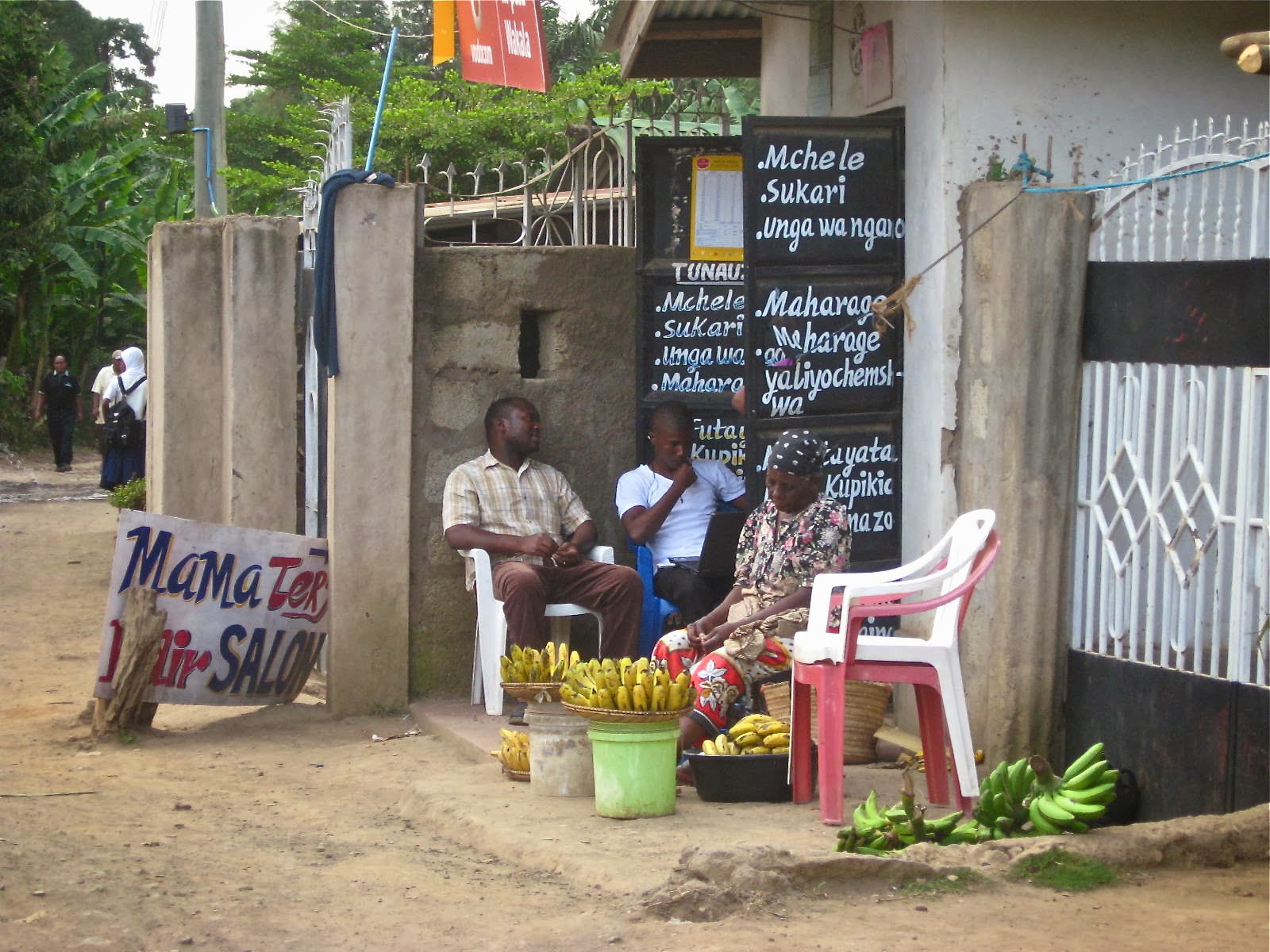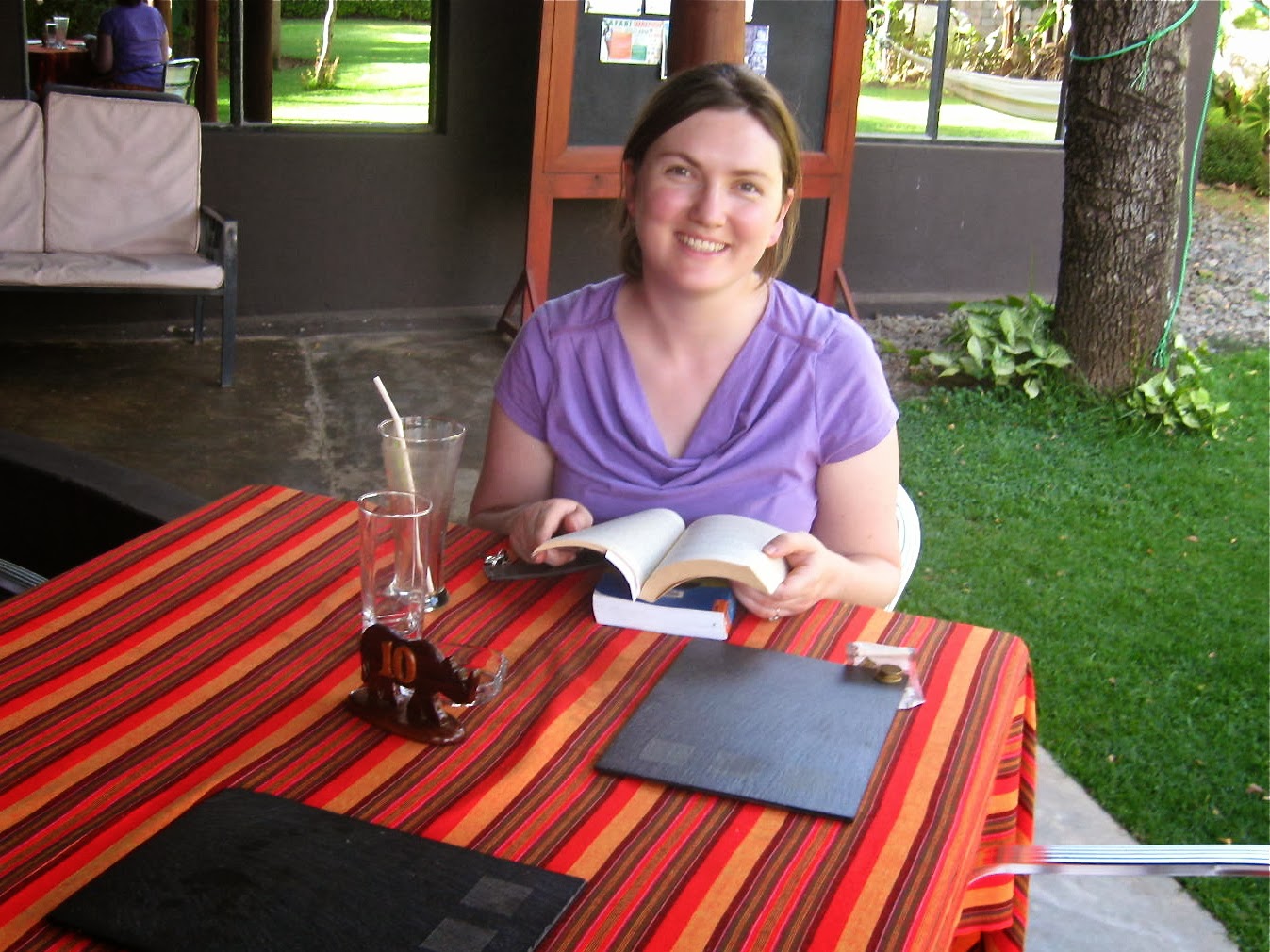This is a walking tour of our neighborhood. There are many more interesting places along the road, but it's not always appropriate to take photos of people.
 |
| Kundayo Road. Nicer houses are in walled compounds. |
 |
| Small dukas (shops) are set along the road. |
 |
| A fruit stand near the road. |
 |
| John's barber shop and a sign for the church that wakes us up around 5:30 every morning. |
 |
| Workers adding a cement walk along a house. |
I could have watched the State of the Union address this morning, as the church to the west of us began their early morning blast of singing at 5:30 a.m. But, I buried my head under my pillow and tried to go back to sleep. The Assembly of God congregation to our east starts its afternoon service at 3:30, and for several hours, our courtyard reverberates with rhythmic preaching, drums, shouts, and full force singing. The only louder, more booming music comes from a nearby bar on the weekends. At least during our normal class hours, 9:00 to 1:00 p.m., there is relative silence.
This week has progressed so normally that there is little for me to write that would be very interesting or noteworthy. The student with the sore throat worried us through Tuesday, but her host family took special care of her, and Megan accompanied her to a Probably-Not-A-Doctor's office for examination and testing--for malaria of all things--and today the student felt well enough to come for the study day. She still looks pretty fragile, but she's definitely on the mend and has a great spirit. All the stomach problems seem to have disappeared as well, though things like that can always pop up again.
During my years in the Congo, I got hepatitis, malaria, and some sort of flesh-eating bacteria, but this is definitely not the Congo, and life here is comparatively very modern and sanitary. In fact, I have never been really sick in Africa in all the many years following my time in the Congo.
Today, the students had a study day, and it was very instructive to notice the difference between the serious and the...well, not so serious. I went out to the terrace to read and noticed that while some students were busily reading, making noted, and discussing the material covered in Core 350, others were Skyping, texting, and laughing and generally messing around. Somewhat surprising to me, one of the students who was not studying at all was one who has talked with John about how she can get an A. Apparently, she thinks she should be given an A, not earn an A. Tomorrow's test will help to separate the wheat from the chaff. These are all very good young adults, but some have a lot more growing up to do to become mature, independent adults.
Because I have been in Africa so often and this is my second time with this program in Tanzania, I realize that I do not have the constant zing of noticing new scenes, events, and people. So much is familiar that it seems normal to me now. I envy the students who find everything unfamiliar and therefore amazing, foreboding, comical, or fascinating. Even Megan is more attune to what is particular or peculiar in our surroundings than I am anymore. This afternoon, she was telling me how upset and angry she feels sometimes at the inefficiency or ineptitude one can see in Africa, and I realized that a those are the things that make me laugh. Really. How else should one react to things that are so bizarrely snafued that nothing can improve them? And, aren't there things at home that are exactly as messed up? Chill and deal with it is my advice.
Almost every evening I do a little laundry--in a plastic bucket with cold water. It takes a long time to get even a small amount adequately washed and rinsed well. Then, I hang as much as I can on the frame for our mosquito netting or drape it over our bed frame. With the fan on, almost everything dries overnight. I draw a line with John's trousers, however, and send them to Kundayo's laundry service which by American standards is not expensive but in the context here seems like a luxury. Some of the students have helped with the hand washing at their host families and are getting a good understanding of the level of labor involved in house-keeping here. African husbands do not help with cooking, cleaning, or any other household chores including childcare, so women work very, very hard. It is for this reason that women who work outside their homes in any type of profession have dadas, usually uneducated village girls, live in to help with all the work.
It's been extremely difficult for me to get online and into this website, so I think that I will resort to some show-and-tell of our environment here at Kundayo.
 |
| John in the door of our unit |
 |
| Maso, our landlord |
 |
| Megan Hershey |
|
|
|
|
Now, I'll show you my super-duper laundry facilities.
 |
| My washing machine |
 |
| My clothesline |
|
|
In only three more days we'll fly to Zanzibar and the whole landscape, lifestyle, and cuisine will be different. Since the island is 99% Muslim, we will all be with Muslim host families. Our former hostess called us last night to tell us how excited she was about seeing us again. Fadhila, who appears with me in the little photo on this blog is incredibly energetic, and I just hope that I can keep up with her and her six children again.










No comments:
Post a Comment